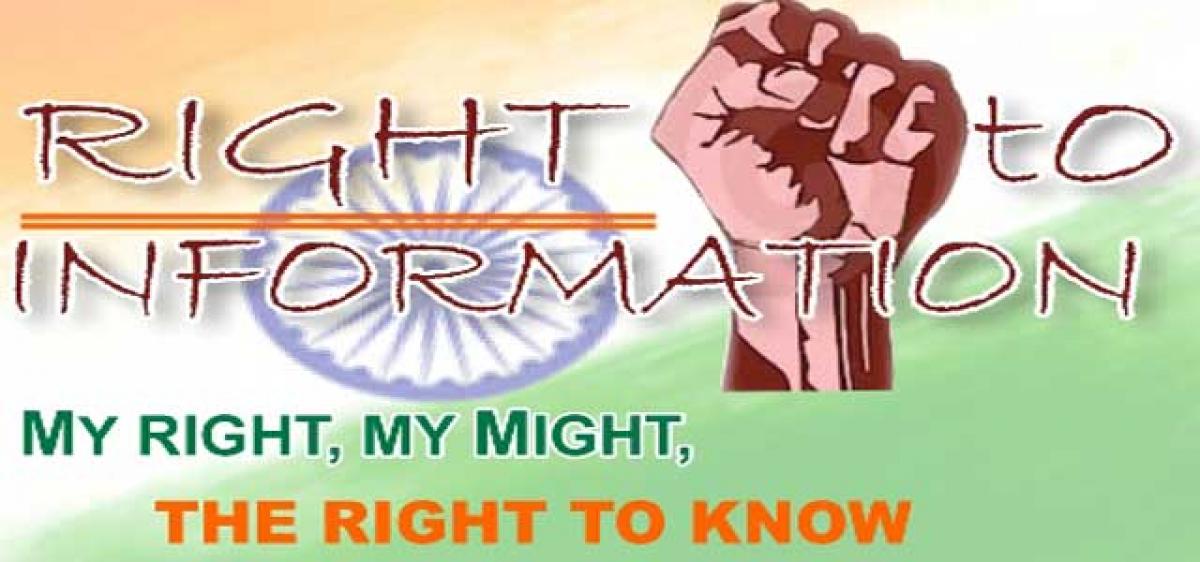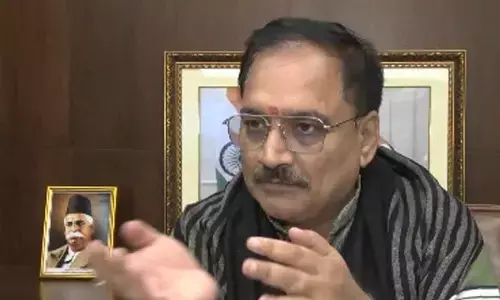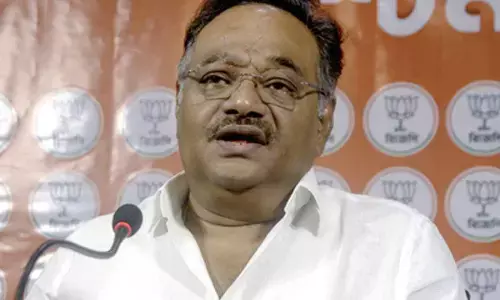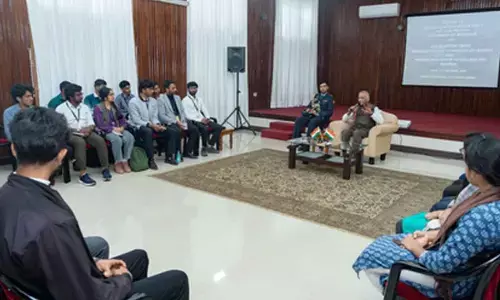Lame excuses for denying RTI

The Delhi University has left the RTI to Registrar and clerks who simply deny information to hundreds of applicants on silly technical grounds and have audacity to spend lakhs of public money for collecting Rs 10 fee though IPO for Rs 10 is submitted.
The RTI Act specifically says that information request could be rejected on the grounds of exemptions prescribed under Section 8 or 9 of RTI Act. The Act does not authorise returning of RTI applications in routine. The decision of CPIO of Delhi University to return the entire application lock stock and barrel on the excuse that addressee space was left blank is without any legal base and totally unjustifiable. He refused application at threshold and was not inclined to arrange information. The mandatory 30-day limit is dismissed by this action. If CPIO has any issues with realisation of that fee for his authority, he has every chance of addressing those issues. By returning the application along with IPO he has closed all those chances
The Delhi University has left the RTI to Registrar and clerks who simply deny information to hundreds of applicants on silly technical grounds and have audacity to spend lakhs of public money for collecting Rs 10 fee though IPO for Rs 10 is submitted.
They have developed a technique of rejecting the RTI requests. R K Jain filed an RTI application on 23.12.2013, requesting detailed information regarding the thesis submitted by PKP Shreyaskar for MBA/Part-time (2009-2012). Jay Chanda, CPIO, Delhi University, deliberately denied.
He alleged that the CPIO erred in rejecting the application on the grounds that: (i) it is addressed to CPIO, Faculty of Management Studies, instead of CPIO of Delhi University, and (ii) the payee column of the postal order of Rs 10 was blank and was not in favour of Registrar.
But the CPIO ignored his written request to fill the appropriate name at the blank IPO. Jain complained that returning amounts to rejection.
The Question: Whether the CPIO of public authority DU can return/reject the original RTI application alleging the IPO as defective, wherein Rs 10 is already paid into account of Government of India? Answer is ‘no’.
Denial of access was admitted but the CPIO made an unsuccessful attempt to justify. Neither the CPIO nor the Registrar could explain the basis of this ‘institutional procedure for admissibility of RTI applications,’ who authorised it and when etc.
The public authority has not published this ‘procedure’ on its official website. They claimed it as internal procedure. It is not shown to be a regulation passed by appropriate body of the public authority. The point 9 of this procedure authorises the CPIO to return the original RTI application: 9.On receipt of the applications with the inadmissible financial instruments from the Section Officer (Finance VII), a letter is prepared by the Information Section addressed to the applicant forwarding the application and financial instrument in original for the purpose of rectification.
This communication is sent by the University through the Deputy Registrar (Information) & CPIO to facilitate its return to the individual concerned through a systematic procedure of returning such applications as a routine in the University over the years.
The CPIO reiterated that the request was not considered as an RTI application and said they returned the RTI applications routinely as per this unauthorised procedure. Even assuming that it was an authorised procedure, the RTI Act overrides it as per the Section 22 of RTI Act. It is not just denial of this RTI application, but a continuous practice of denying applications in routine, which appears to be seriously flawed.
The complainant explained that if RTI request of advocate is being stone-walled by a self-proclaimed ‘institutional procedure,’ a student, who is at the mercy of the University authorities, may not venture to challenge them for fear of their stay in University, future and career.
Complaint says that the students are in fact suffering a lot due to this attitude of officers and hence he was seriously pursuing this issue. He also said that the CPIO being a public servant was expected to act in conformity of the law under which he was designated as an authority.
The RTI Act specifically says that information request could be rejected on the grounds of exemptions prescribed under Section 8 or 9 of RTI Act. Section 5(2) of RTI Act says every public authority shall designate an officer to receive the applications for information… The Act does not authorise such returning of RTI applications in routine.
Section 5(2) also says that every CPIO shall deal with requests from persons seeking information and render reasonable assistance. Section 5(4) says the CPIO may seek assistance of any other officers for proper discharge of his duties.
Section 5(5) says any officer whose assistance is sought shall render all assistance to the CPIO, and for the purposes of any contravention of provisions of this Act such officer shall be treated as CPIO. All these provisions of RTI Act were ignored. Returning/rejecting of application for RTI could be a ground for complaint under Section 18(1). Returning of RTI application in this case amounts to refusing to receive an application.
While explaining the disposal of request, the RTI Act, Section 7(1) clearly said that the CPIO…..either provides the information on payment of such fee as may be prescribed or reject the request for any of the reasons specified in sections 8 and 9. The issue remained is the point of payment of fee. Whether appellant/complainant paid the fee of Rs 10?
Only point repeatedly argued and heavily dependent upon by the CPIO was that IPO was not completely filled. No other reason for rejection was mentioned by the CPIO in all of his explanations. The IPO stands proof of his payment of fee. Leaving space for addressee blank in IPO does not render the entire RTI application as ‘no application’ as alleged by the CPIO. The IPO in this case is not invalid.
The CPIO has every authority to collect the fee prescribed. But when IPO indicates that Rs 10 is paid to Government of India, the RTI application cannot be considered as without payment. Even non-payment of fee cannot be a ground for rejection of RTI application.
Only grounds for rejection are specifically provided under Sections 8 and 9. Reading Section 6 and 7 together and understanding the spirit of RTI Act as a whole should make the CPIO act reasonably and provide information rather than searching for excuses to reject.
The expression “on payment of such fee” means both fee of Rs 10 and further fee representing cost of copying. For that the CPIO has to accept and study the RTI Application, get ready to give the information sought, if not exempted, and seek payment of cost of copying and on receipt of additional fee, if needed, and then the information needs to be provided. What is the significance of fee of ‘Rs. 10’?
Does it represent the value of the information, cost of its searching, labour charge for preparing the information or consideration for it? No. The decision of CPIO to return the entire application lock stock and barrel on the excuse that addressee space was left blank is without any legal base and totally unjustifiable.
He refused application at threshold and was not inclined to arrange information. The mandatory 30-day limit is dismissed by this action. If CPIO has any issues with realisation of that fee for his authority, he has every chance of addressing those issues. By returning the application along with IPO he has closed all those chances.
The public authority and the CPIO have built up a huge case, dozens of lengthy letters, commissioning a Senior Standing Council, seeking adjournments, spending huge amount in attending several adjournments over a period of 18 months, just for Rs 10. It reminds one of the English maxims: ‘penny wise and pound foolish.’
The CPIO, Jay Chanda, who was repeatedly complaining that he was not given sufficient time expressed satisfaction after using all time given to him, in the presence of all his colleagues, officers.
The appeal is allowed because the information sought was not given and all the ways to get such information were closed by returning of RTI application. The CPIO is directed to provide the information sought, free of cost.
The Commission required under the Section 19(8)(iv) of RTI Act that the public authority replace the ‘institutional practice’ with a regulation of comprehensive procedural guidelines compatible with RTI Act to guide the CPIO and FAA to prevent routine returning of IPOs and RTI applications as happened in this case.
The Commission also suggested to the public authority to arrange for sufficient training for the RTI authorities, dealing officers and staff, provide latest books on RTI Act, and supply the classic text books on “Administrative Law” and “Right to Know” by late Professor S P Sathe. The training curriculum may also include the judgment of Justice Rajiv Sahai Endlaw of Delhi High Court
in JP Agrawal v Union of India, (also available on https://indiankanoon.org/doc/104466988/). A penalty of Rs 25,000 was imposed on the CPIO. (Based on the decision in RK Jain v Delhi University, CIC/RM/C/2014/000138-SA)














